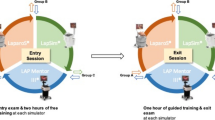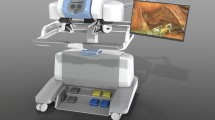Abstract
The objective of this paper is to describe the current status, advantages, and disadvantages of Virtual Reality simulators as tools for training and assessment of laparoscopic skills. This is a review of publications about Virtual Reality simulators in laparoscopic training and assessment. Information was obtained through author’s experience and by search of MEDLINE using the keywords Virtual Reality simulation, training, assessment and laparoscopic surgery. The references cited in these studies were reviewed to find out whether any other trials fitted the selection criteria. There are several validated Virtual Reality systems that allow the transfer of skills from the virtual environment to the operating room and objective assessment of operative skills in laparoscopic surgery. In conclusion, Virtual Reality simulators are valid and objective tools in surgical education. Several systems are currently considered sufficiently validated and ready to be implemented in comprehensive educational curricula in minimally invasive surgery.

Similar content being viewed by others
Reference
Deziel DJ, Milikan KW, Economou SG, Doolas A, Ko ST, Airan MC (1993) Complications of laparoscopic cholecystectomy: a national survey of 4,292 hospitals and an analysis of 77,604 cases. Am J Surg 165:9–14
Jordan JA, Gallagher AG, McGuigan J, McClure N (2001) Virtual reality training leads to faster adaptation to the novel psychomotor restrictions encountered by laparoscopic surgeons. Surg Endosc 15:1080–1084
Carter FJ, Schijven MP, Aggarwal, Grantcharov T, Francis NK, Hanna GB, Jakimowicz JJ, Work Group for Evaluation and Implementation of Simulators and Skills Training Programmes (2005) Consensus guidelines for validation of virtual reality surgical simulators. Surg Endosc 19:1523–1532
Seymour NE, Gallagher AG, Roman SA, O’Brien MK, Bansal VK, Andersen DK, Satava RM (2002) Virtual reality training improves operating room performance: results of a randomized, double-blinded study. Ann Surg 236:458–463
Grantcharov TP, Kristiansen VB, Bendix J, Bardram L, Rosenberg J, Funch-Jensen P (2004) Randomized clinical trial of virtual reality simulation for laparoscopic skills training. Br J Surg 91:146–150
Grantcharov TP, Bardram L, Funch-Jensen P, Rosenberg J (2002) Assessment of technical surgical skills. Eur J Surg 168:139–144
Darzi A, Smith S, Taffinder N (1999) Assessing operative skill. Needs to become more objective. BMJ 318:887–888
Hyltander A, Liljegren E, Rhodin PH, Lonroth H (2002) The transfer of basic skills learned in a laparoscopic simulator to the operating room. Surg Endosc 16:1324–1328
Carter FJ, Francis NK, Tang B, Martindale JP, Cuschieri A (2003) Validation of a virtual reality simulator with error analysis of a simulated surgical procedure (abstract). Surg Endosc 17(Suppl1):S63
Hance J, Aggarwal R, Undre S, Patel H, Darzi A (2004) Evaluation of a laparoscopic video trainer with in-built measures of performance. Proceedings of the 13th Society of Laparoendoscopic meeting and EndoExpo, New York, USA, 29 September–2 October 2004
Ayodeji ID, Schijven MP, Jakimowicz JJ, Bonjer HJ (2004) Face validation of the LapMentor laparoscopy trainer (abstract). Fall meeting of the Dutch Society of Surgery. Ede, The Netherlands
Taffinder N, Russel RCG, McManus IC, Jansen J, Darzi A (1998) An objective assessment of surgeons’ psychomotor skills: validation of the MIST–VR laparoscopic simulator. Br J Surg 85(Supp 1):75
McNatt SS, Daniel Smith C (2001) A computer-based laparoscopic skills assessment device differentiates experienced from novice laparoscopic surgeons. Surg Endosc 15:1085–1089
Gallagher AG, Richie K, McClure N, McGuigan J (2001) Objectiev psychomotor skills assessment of experienced, junior and novice laparoscopists with virtual reality. World J Surg 25:1478–1483
Gallagher AG, Satava RM (2002) Virtual reality as a metric for the assessment of laparoscopic psychomotor skills: learning curve and reliability measures. Surg Endosc 16:1746–1752
Grantcharov TP, Bardram L, Funch-Jensen P, Rosenberg J (2003) Learning curves and impact of previous operative experience on performance on a virtual reality simulator to test laparoscopic surgical skills. Am J Surg 185:146–149
Gallagher AG, Lederman AB, McGlade K, Satava RM, Smith CD (2004) Discriminative validity of the minimally invasive surgical trainer-virtual reality (MIST-VR) using criteria levels based on expert performance. Surg Endosc 18:660–665
Eriksen J, Grantcharov T (2005) Objective assessment of laparoscopic skills using virtual reality simulator. Surg Endosc 19:1216–1219
Aggarwal R, Grantcharov TP, Eriksen JR, Blirup D, Kristiansen VB, Funch-Jensen P, Darzi A (2006) An evidence-based virtual reality training program for novice laparoscopic surgeons. Ann Surg 244:310–314
Larsen CR, Grantcharov T, Aggarwal R, Tully A, Sorensen JL, Dalsgaard T, Ottesen B (2006) Objective assessment of gynecologic laparoscopic skills using the LapSimGyn virtual reality simulator. Surg Endosc 20:1460–1466
Grantcharov TP, Rosenberg J, Pahle E, Funch-Jensen P (2001) Virtual reality computer simulation: an objective method for the evaluation of laparoscopic surgical skills. Surg Endosc 15:242–244
Grantcharov TP, Funch-Jensen P (2006) Learning curve patterns in technical skills acquisition in laparoscopic surgery. Can anyone learn it? Association of Surgeons of Great Britain and Ireland (ASGBI) Congress, Edinburgh, 3–6 May
Salgado J, Grantcharov TP, Papasavas P, Gagne D, Caushaj P (2006) Technical skills assessment as a part of the selection process of fellows in minimally invasive surgery. 10th World congress of endoscopic surgery, Berlin, Germany, 13–16 September
Kopta JA (1971) An approach to the evaluation of operative skills. Surgery 70:297–303
Grantcharov TP, Schulze S, Kristiansen VB (2004) The impact of objective assessment and constructive feedback on improvement of laparoscopic performance in the operating room. 12th Congress of the European Association for Endoscopic Surgery (EAES), Barcelona, Spain, 9–12 June
Author information
Authors and Affiliations
Corresponding author
Rights and permissions
About this article
Cite this article
Grantcharov, T.P. Virtual reality simulation in training and assessment of laparoscopic skills. Eur Clinics Obstet Gynaecol 2, 197–200 (2006). https://doi.org/10.1007/s11296-006-0054-5
Received:
Accepted:
Published:
Issue Date:
DOI: https://doi.org/10.1007/s11296-006-0054-5




